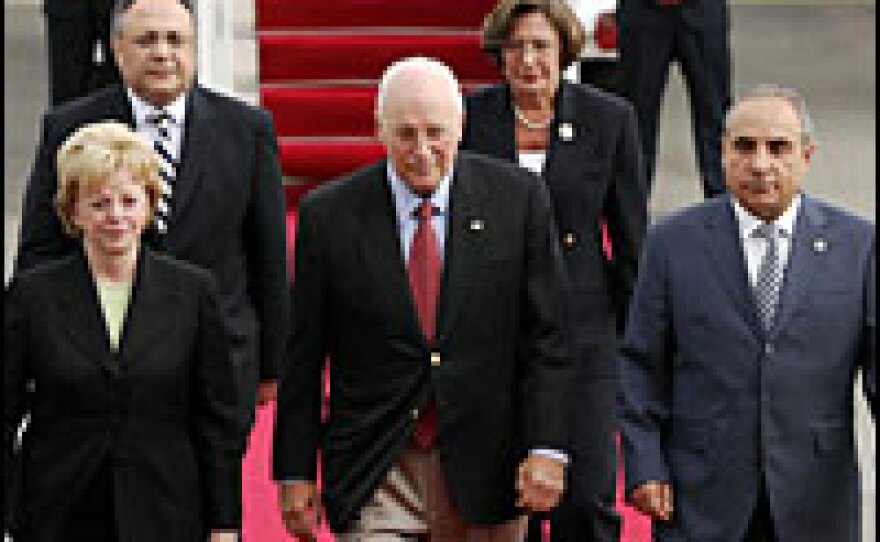Vice President Dick Cheney is visiting three former republics of the Soviet Union this week. He wants to offer U.S. support after Russia's invasion of Georgia last month.
Cheney visits Azerbaijan on Wednesday, and will fly to Ukraine on Friday. But Thursday, the vice president will be in Tbilisi, Georgia, where the government wants money for economic reconstruction, help in rebuilding its military and protection from any future attack from Russia.
Cheney will be the highest ranking American official to visit Georgia since the Russian invasion. On Wednesday, Secretary of State Condoleezza Rice said the United States will give at least $1 billion in aid — but stressed this was not military aid — to help rebuild the country.
For many in Georgia, like Alexander Rondeli, the president of the Georgian Foundation for Strategic and International Studies, Cheney's visit signifies not only American support for Georgia's independence, but protection from further Russian attack.
"It's a sign of good will of American nation, and it's a sign of American support to a small country bordering gangster Russia," Rondeli says.
A Place In NATO?
Senior American officials have already visited Georgia to pledge humanitarian aid and financial backing for reconstruction, but Georgian President Mikhail Saakashvili and many others here want more. They want a fast track to membership in the NATO alliance, and short of that, Rondeli says, they want the U.S. to pledge protection.
"We are sure that the United States will try to protect us through collective security system, or maybe it will be bilateral. Who knows?" Rondeli says.
Earlier this year at a NATO summit in Romania, President Bush urged NATO membership for Georgia, but there was opposition to that among European allies — France and Germany in particular.
Then-Russian President Vladimir Putin warned NATO that Moscow would look on NATO membership for Georgia and Ukraine — also a candidate — as a military threat.
During the short war in August, Russian tanks and armor smashed Georgia's small army and, for the moment, Georgia is utterly defenseless. Putin and the current Russian president, Dmitri Medvedev, say that the U.S. is secretly smuggling arms to Georgia through ships bringing humanitarian aid.
The U.S. has denied this, but there are those in Georgia who hope that it's true.
"I hope the vice president is bringing a package here that will help rebuild Georgia — including its military — supply it with the right kind of weapons, including anti-aircraft weapons, and start pushing for a membership action plan in NATO," says David Smith, an American living in Tbilisi and director of the Georgian Security Analysis Center. He is an occasional adviser to the Georgian government.
Strength Among The People
Although Georgia was unable to stand up to the Russian military, political and patriotic spirits have only been strengthened. On Monday, hundreds of thousands of people poured into the streets of Tbilisi and other towns and villages, chanting "Georgia yes, Russia no."
"This is a demonstration that Georgian people want freedom," one supporter says. "Georgian people don't want Russia, and we want freedom."
Many people in the crowd believe that the U.S. will come to the country's aid, but it is far from clear how realistic that expectation is — what the U.S. is willing to risk, if anything, to challenge Russia's action in Georgia.
Rondeli concedes this lack of realism in Georgia today.
"Well, maybe it's not very realistic, but we Georgians are not very realistic," Rondeli says. "If we were very realistic, we wouldn't fight Russians and we would pull back. ... When you are sometimes just struggling for survival, sometimes you are not very realistic."
Smith argues that the Russian military move against Georgia was the first battle in a potentially much wider conflict.
"This is a war against the post-1991 world order, and the Russians perceive that as an order dominated by the United States, by NATO and the European Union," Smith says. "This is a war on that order, and we had better wake up and understand what it is."
This is a view many in Georgia hold, but there is little accord in Europe and the U.S. about whether it is true, and even less agreement what to do about it, if it is.
Copyright 2022 NPR. To see more, visit https://www.npr.org. 9(MDAzMjM2NDYzMDEyMzc1Njk5NjAxNzY3OQ001))







